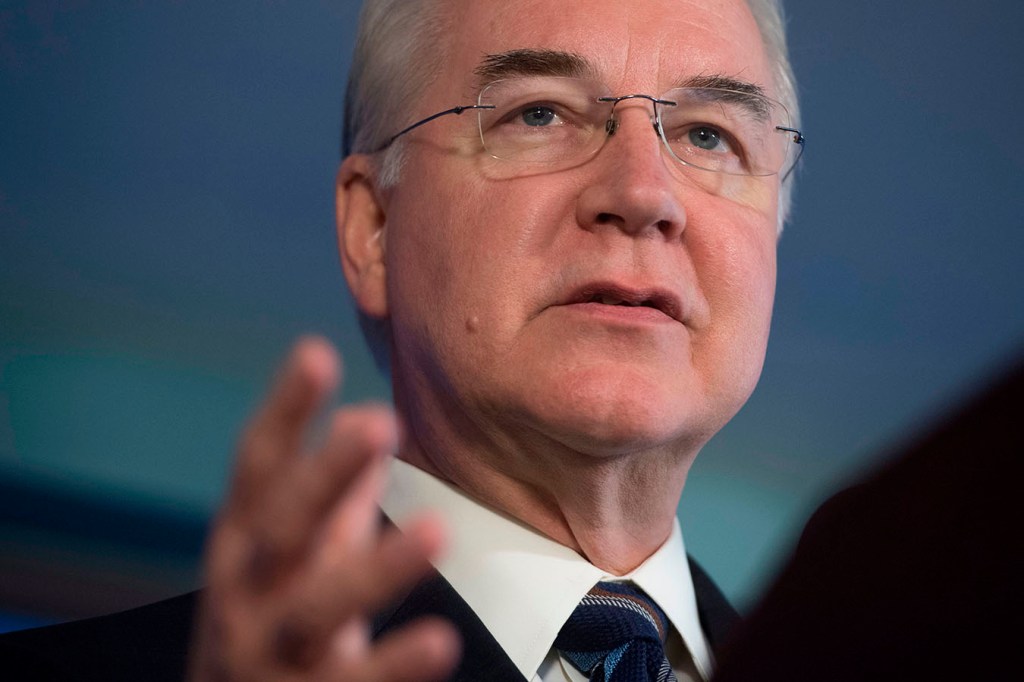In a surprising reversal, Dr. Tom Price said he now thinks getting rid of the individual mandate was a bad idea.
Yet this is the same Tom Price who only last summer laid the groundwork for the mandate’s eventual dismantling, saying it was “driving up the costs for the American people.”
In some of his first public remarks since resigning as secretary of Health and Human Services amid a scandal about his travel expenses last September, Price criticized the elimination of the Affordable Care Act’s penalty for those who don’t have insurance.
“There are many, and I’m one of them, who believes that that actually will harm the pool in the exchange market,” he said Tuesday, as one of several dozen keynote speakers at the annual World Health Care Congress in Washington. “Because you’ll likely have individuals that are younger and healthier not participating in that market, and consequently that drives up the costs for other folks within that market.”
At the conference, Price re-introduced himself — a third-generation physician who did “a short stint at HHS” — to insurers, drugmakers and other health industry types.
Washington could be forgiven for thinking they had met before.
As a congressman and then HHS secretary, he’d been a vocal critic of the ACA, lambasting its many elements — including the individual mandate — and pressing for the law’s full repeal. Months after Price’s resignation, that penalty was removed by Congress as part of a tax bill even as the ACA itself remained, having withstood multiple Republican attempts to kill it.
It has been seven months since Price stepped down amid reports he misspent hundreds of thousands of dollars of taxpayer money on private charter and military air travel. Price sidestepped questions Tuesday about the Trump administration and his change of heart on the individual mandate.
But Price’s re-emergence offered a snapshot of a tarnished former Trump administration official working on his next act. In January, he joined the board of the Atlanta-based Jackson Healthcare, a health care staffing and technology company.
A conference spokeswoman did not respond to inquiries about the decision to invite Price and whether he was paid to give remarks. The conference organizers played down Price’s remarks, billed as “a candid perspective” on the prospects for efforts to repeal and replace the Affordable Care Act and timed early on the third day of the four-day conference. He was conspicuously absent from the headshots of featured speakers splashed across the conference website and cagey about his plans for the future, referring only to his “advisory roles” when asked.
Gone was the Tom Price who, as a leading critic of the ACA while a Republican congressman from Georgia, attracted the attention of President Donald Trump. But it was the administration’s fight against the ACA that, by many accounts, cost him Trump’s support.
Price “better get the votes,” Trump said in a speech last July, days before the Senate rejected one of the last in a round of attempts to repeal President Barack Obama’s signature health care law. “Otherwise I will say, ‘Tom, you’re fired’.”
“From a policy standpoint, the repeal-and-replace battle last year was kind of the height of political frustration, wasn’t it?” Price mused to the audience Tuesday.
Instead of hammering the ACA, Price offered a brisk, occasionally perfunctory assessment of the health care landscape, ticking off a list of challenges (regulation, bad; wearables such as Fitbits, good) and developments (the health care market, stable; association health plans, under review). The states are doing their own assessments and reacting to it — and rightfully so, he said, pointing to decisions by Republican-led states such as Utah to expand Medicaid. (He had opposed the expansion of Medicaid as a congressman.)
On this, Price could offer an expert up-close opinion: “These are states that have looked at the situation, don’t necessarily see a solution coming out of Washington.”







